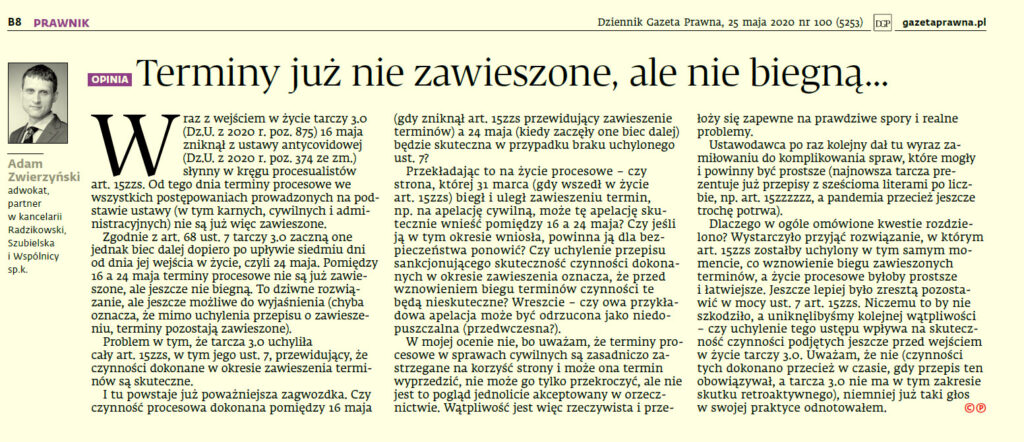From 16 May, the procedural time limits are no longer suspended. However, they have only been running since 24 May. What is this state of affairs where time limits do not run but are not suspended, and will a letter filed during the transitional period have effect? Adam Zwierzynski addresses this conundrum in today’s Dziennik Gazeta Prawna.
Time limits no longer suspended and yet not running…
Adam Zwierzyński, 25 May 2020, Dziennik Gazeta Prawna
Along with the entry into force of Shield 3.0 (Journal of Laws 2020, item 875) on 16 May, Article 15zzs, well known in the circle of litigation lawyers, disappeared from the Anti-Covid Act (Journal of Laws 2020, item 374, as amended). From that date, procedural time limits in all proceedings conducted under the Act (including criminal, civil and administrative cases) are therefore no longer suspended. However, pursuant to Article 68(7) of Shield 3.0, these time limits will not continue to run until seven days elapse after the date of its entry into force, i.e. 24 May.
As Shield 3.0 (Journal of Laws 2020, item 875) entered into force on 16 May, Article 15zzs, well known in the circle of litigation lawyers, disappeared from the Anti-Covid Act (Journal of Laws 2020, item 374, as amended). From that date, procedural time limits in all proceedings conducted under the Act (including criminal, civil and administrative cases) are therefore no longer suspended.
Pursuant to Article 68(7) of Shield 3.0, these time limits will not continue to run until seven days elapse after the date of its entry into force, i.e. 24 May. Between 16 May and 24 May, procedural time limits are no longer suspended, but they are not yet running. This is a strange solution, but still capable of being explained (it probably means that despite the repeal of the suspension provision, the time limits remain suspended).
The problem is that Shield 3.0 repealed the whole Article 15zzs, including its paragraph 7 which provides that actions carried out during the period of suspension of time limits are effective.
And this is where a more serious problem arises. Will a procedural action carried out between 16 May (when Article 15zzs providing for the suspension of time limits disappeared) and 24 May (when the time limits were resumed) be effective in the absence of the repealed paragraph 7?
Translating this into litigation practice – may a party who on 31 March (when Article 15zzs entered into force) had a time limit running and suspended for e.g. filing an appeal in a civil case, lodge that appeal effectively between 16 May and 24 May? If that party lodged the appeal during this period, should it lodge the appeal again out of caution? Does the repeal of the provision sanctioning the effectiveness of actions carried out during the period of suspension mean that those actions will be ineffective before the time limits are resumed? Finally, can this example appeal be rejected as inadmissible (premature?).
In my opinion, the answer is no because I believe that procedural time limits in civil cases are in principle reserved in favour of a party and the party may be ahead of a time limit but cannot exceed it, though this is not a view consistently held in the jurisprudence of the courts. The doubt is therefore real and will probably translate into actual disputes and real problems.
The legislators, again, have shown their penchant for complicating matters that could and should have been simpler (the newest Shield already has provisions with six letters following the number, e.g. Article 15zzzzzz, and the pandemic will stay here for a while).
Why were the issues at hand separated in the first place? It was sufficient to adopt a solution where Article 15zzs would be repealed simultaneously with the resumption of the suspended time limits, and litigation practice would be simpler and easier. It would have been even better to leave paragraph 7 of Article 15zzs in place. This would have done no harm and we would have avoided another doubt – whether the repeal of this paragraph affects the effectiveness of actions carried out still before Shield 3.0 entered into force. I believe that it does not (these actions were carried out at a time when this provision was in force, and Shield 3.0 has no retroactive effect in this respect), but I have already seen such an approach in my practice.




